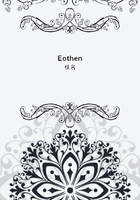
第33章
During the hours that this sort of conversation, or rather discourse, was going on our TCHIBOUQUES were from time to time replenished, and the lady as well as I continued to smoke with little or no intermission till the interview ended. I think that the fragrant fumes of the latakiah must have helped to keep me on my good behaviour as a patient disciple of the prophetess.
It was not till after midnight that my visit for the evening came to an end. When I quitted my seat the lady rose and stood up in the same formal attitude (almost that of a soldier in a state of "attention") which she had assumed at my entrance; at the same time she let go the drapery which she had held over her lap whilst sitting and allowed it to fall to the ground.
The next morning after breakfast I was visited by my lady's secretary - the only European, except the doctor, whom she retained in her household. This secretary, like the doctor, was Italian, but he preserved more signs of European dress and European pretensions than his medical fellow-slave. He spoke little or no English, though he wrote it pretty well, having been formerly employed in a mercantile house connected with England. The poor fellow was in an unhappy state of mind. In order to make you understand the extent of his spiritual anxieties, I ought to have told you that the doctor (who had sunk into the complete Asiatic, and had condescended accordingly to the performance of even menial services) had adopted the common faith of all the neighbouring people, and had become a firm and happy believer in the divine power of his mistress. Not so the secretary.
When I had strolled with him to a distance from the building, which rendered him safe from being overheard by human ears, he told me in a hollow voice, trembling with emotion, that there were times at which he doubted the divinity of "miledi." I said nothing to encourage the poor fellow in that frightful state of scepticism which, if indulged, might end in positive infidelity. I found that her ladyship had rather arbitrarily abridged the amusements of her secretary, forbidding him from shooting small birds on the mountain-side. This oppression had arouses in him a spirit of inquiry that might end fatally, perhaps for himself, perhaps for the "religion of the place."I have been recently told that this Italian's pretensions to the healing art were thoroughly unfounded. My informant is a gentleman who enjoyed during many years the esteem and confidence of Lady Hester Stanhope: his adventures in the Levant were most curious and interesting.
The secretary told me that his mistress was greatly disliked by the surrounding people, whom she oppressed by her exactions, and the truth of this statement was borne out by the way in which my lady spoke to me of her neighbours. But in Eastern countries hate and veneration are very commonly felt for the same object, and the general belief in the superhuman power of this wonderful white lady, her resolute and imperious character, and above all, perhaps, her fierce Albanians (not backward to obey an order for the sacking of a village), inspired sincere respect amongst the surrounding inhabitants. Now the being "respected" amongst Orientals is not an empty or merely honorary distinction, but carries with it a clear right to take your neighbour's corn, his cattle, his eggs, and his honey, and almost anything that is his, except his wives. This law was acted upon by the princess of Djoun, and her establishment was supplied by contributions apportioned amongst the nearest of the villages.
I understood that the Albanians (restrained, I suppose, by the dread of being delivered up to Ibrahim) had not given any very troublesome proofs of their unruly natures. The secretary told me that their rations, including a small allowance of coffee and tobacco, were served out to them with tolerable regularity.
I asked the secretary how Lady Hester was off for horses, and said that I would take a look at the stable. The man did not raise any opposition to my proposal, and affected no mystery about the matter, but said that the only two steeds which then belonged to her ladyship were of a very humble sort.
This answer, and a storm of rain then beginning to descend, prevented me at the time from undertaking my journey to the stable, which was at some distance from the part of the building in which I was quartered, and I don't know that Iever thought of the matter afterwards until my return to England, when I saw Lamartine's eye-witnessing account of the horse saddled by the hands of his Maker!